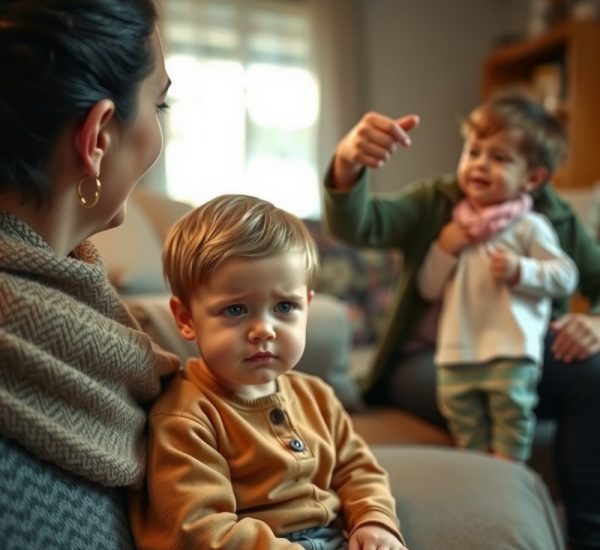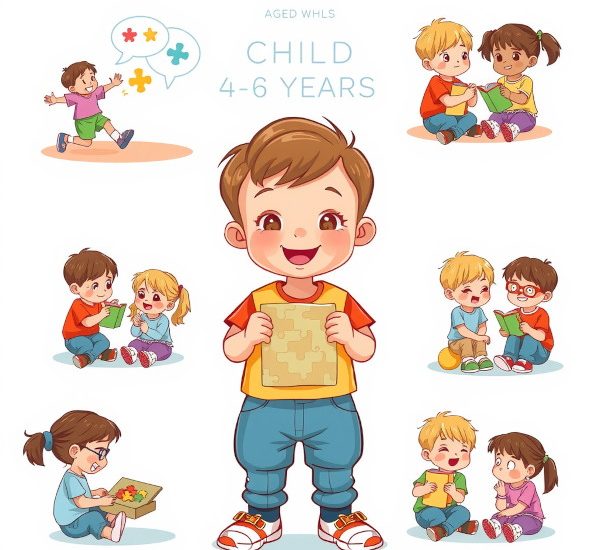My daughter Emma is almost 3 years old and as a mother, I am overwhelmed by the immense responsibility I have had during this period. Brain development is the most dynamic action that occurs during this early period and has repercussions throughout life. Therefore, it is important to understand why the first 3 years of a child’s life are important, even crucial for them, and how we can help them.
The way a child behaves positively or negatively depends heavily on their age and how willing or prepared they are to listen or do certain things. Depending on the child’s age, we can do certain things or not. The child’s needs vary according to their age and it is important to know how their brain develops and understand what they can and cannot do at a certain point in time. Do you think of your child as an adult or a small child who can be fooled or manipulated? How do you see your child? Do you show respect to your child? However, the child is not an adult. Children are very different from us adults in many ways.
Although the general structure of the adult brain is relatively constant, the ability to use these brain areas can be influenced by experiences and the environment. Looking at the anatomy of an adult’s brain, we can see that the prefrontal cortex is in front, responsible for planning, decision-making, patience, and self-regulation. The frontal lobe is responsible for thinking and short-term memory. The occipital lobe processes visual images. The parietal lobe processes touch, taste, pain, and senses. The temporal lobe interprets sounds and speech, and the cerebellum coordinates body movements. It is important to know that the human brain matures gradually, from back to front and from bottom to top. The prefrontal cortex is the last to develop. Our brain continues to develop until the age of 21-22.
The difference between the brain of a 3-year-old child and that of an adult is immense. It is also useful to know that a child’s brain develops very rapidly in the first years of life: a baby’s brain weighs about 300 grams at birth, and the most accelerated growth occurs in the first 2 years. At the end of the second year, the brain weighs approximately 900 grams, almost triple its weight at birth. A significant and large leap occurs between 2-3 years. It is good to know that as the child grows, the brain develops more slowly.
To contribute to the harmonious development of the child, it is important to understand the stages of development they go through and to adapt our methods of education and communication accordingly. It is important to encourage positive behavior and offer constructive feedback when they make mistakes. In this way, we can help them develop social skills, learn how to cooperate and communicate with others in a healthy and age-appropriate manner. During this period, numerous connections are formed between brain cells (neurons), and these connections will significantly influence the child’s subsequent cognitive, emotional, and social development.
Here are some important aspects of brain development in children aged 0-3 years:
- Neurons connect rapidly: Early experiences of the child, such as play, interaction with parents and the surrounding environment, are essential in helping to form new neuronal connections. For example, when a child starts to explore the environment, such as touching and observing new objects, they develop sensory abilities and spatial perception. Also, interaction with parents, such as smiling and tactile interactions, helps to develop neuronal connections and increase the child’s level of safety and self-confidence.
- Language development: In the first months of life, children begin to produce sounds, such as cries and cooing, which are precursors to language. At around 6 months of age, children begin to recognize the specific sounds of language and start to develop their ability to distinguish between different sounds. As children grow, they begin to learn words and develop their vocabulary, and at around 2 years of age, they begin to form simple sentences.
- Motor skills development: In the first months of life, children develop their motor skills through repeated movements, such as crawling and holding their head up. At around 9 months of age, most children begin to walk and develop their fine motor skills, such as grasping small objects. Developing motor skills is important in helping the child to be independent and perform daily tasks.
- Social and emotional development: In the early years of life, children begin to learn how to interact with the people around them and develop social relationships. They begin to learn how to communicate their needs and desires and express their emotions. During this period, it is important for parents and caregivers to provide the child with a safe and affectionate environment that helps to develop self-confidence and positive social relationships.
- Cognitive skills development: In the first years of life, children begin to learn how to make connections between different aspects of their environment. For example, they begin to learn that certain sounds are associated with certain objects or actions, such as the sound of the bell announcing mealtime. As children grow, they begin to learn and use more complex concepts, such as colors and numbers.
- Social skills development: During this period, children begin to learn how to interact with others and develop social relationships. They learn how to express their feelings and to express their desires and needs in a socially appropriate manner. For example, they begin to learn how to share toys and how to help their friends.
- Imagination and creativity development: In the early years of life, children begin to develop their imagination and creativity. They begin to create and explore the world around them through play and creative activities, such as drawing or painting.
- Autonomy and independence development: During this period, children begin to develop their skills to do things on their own and to be autonomous. For example, they begin to choose their own clothes and feed themselves. These skills are essential for developing self-confidence and preparing the child for the next stages of their development.
- Concentration and attention skills development: In the first years of life, children begin to develop their concentration and attention skills. They begin to focus their attention on objects and activities for increasingly longer periods of time. For example, children may be able to follow a moving toy or concentrate on a storybook as they grow.
- Problem-solving skills development: During this period, children begin to develop their problem-solving skills for simple problems. For example, children can learn to build a tower of blocks or find hidden toys. Developing these skills is important for developing critical thinking and resilience.
- The development of empathy and emotional understanding: In the first years of life, children begin to develop their abilities to empathize with others and understand emotions. They start to learn to recognize the facial and vocal expressions of others and associate them with certain emotions, such as happiness or sadness. This development of emotional abilities is essential for the development of healthy social relationships and empathy.
- Development of communication skills: During this period, children begin to learn how to communicate with others. They start to develop their verbal and nonverbal communication skills and begin to understand the meaning of words and gestures. Developing these skills is essential for effective communication and for developing social relationships.
- Development of memory skills: In the first years of life, children begin to develop their memory skills. They start to remember the faces and voices of their parents and begin to recognize familiar objects and places. Developing these skills is important for learning and for the later development of cognitive skills.
- Development of play and exploration skills: During this period, children begin to develop their play and exploration skills. They start to play with toys and explore their environment, and these activities help to develop their imagination, creativity, and cognitive skills.
- Development of adaptation and problem-solving skills: In the first years of life, children begin to develop their adaptation and problem-solving skills. They learn to adapt to new situations and find solutions to simple problems, such as choosing an object or solving a puzzle.
- Development of learning and attention skills: During this period, children begin to develop their learning and attention skills. They start to focus their attention on objects and activities and begin to learn from their experiences. These skills are essential for continuous learning and for the development of cognitive skills.
It is also important to encourage positive behavior and provide constructive feedback when the child makes mistakes. This can help them develop social skills and learn how to cooperate and communicate with others in a healthy and age-appropriate manner. As children develop, it is inevitable that they will make mistakes and exhibit behaviors that are not appropriate. In such moments, it is important for parents and caregivers to encourage positive behavior and provide constructive feedback to help the child learn and develop social skills. At the same time, it is important to offer constructive feedback when the child makes mistakes. This way, the child can learn from their mistakes and develop social skills by improving their behavior. For example, if a child behaves aggressively or does not share their toys, parents can explain why their behavior is not appropriate and offer alternative solutions.
In the last year of the child’s life between 0-3 years, their brain continues to develop, but at a slower pace than in the first two years. During this period, it is important to provide opportunities for the child to develop their skills and pay attention to their specific needs. However, this does not mean that brain development stops completely. During this period, the child continues to develop social, emotional, cognitive, and motor skills, and parents and caregivers can play an important role in this development.
It is important to know these details about a child’s development in the first years of life because these years are critical in shaping the child’s personality and behavior. Cognitive and emotional development occurs during this period, and the child’s early experiences can influence their long-term development.
If a child receives appropriate guidance and support during this period, they can develop healthy social, emotional, and cognitive skills that will help them navigate life more easily. On the other hand, if a child does not receive adequate guidance and support during this period, they may have difficulties managing emotions and social relationships in the long term.
It is also important to keep in mind that the child’s brain is still developing and is not yet an adult. The prefrontal cortex, which is responsible for impulse control and decision making, is only in the early stages of development in the first years of life. Therefore, it is important to be patient and offer our child appropriate support and guidance to help them develop their skills and learn how to make decisions and regulate their emotions.
Therefore, the first years of life are critical for a child’s development, and it is important to know the details about this development in order to offer our child appropriate support and guidance during this period. By providing appropriate experiences and guidance, we can help our child develop healthy social, emotional, and cognitive skills that will be useful to them in the long term.




